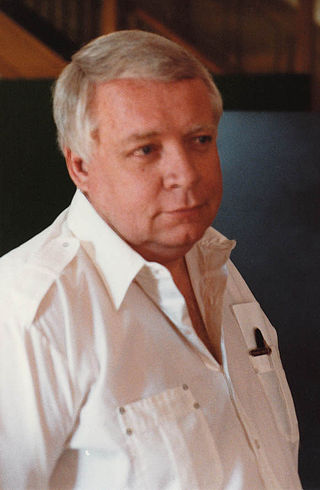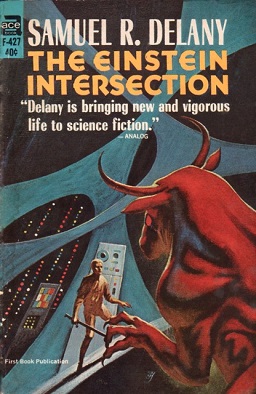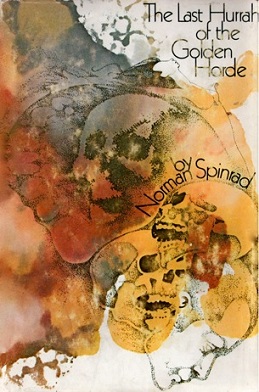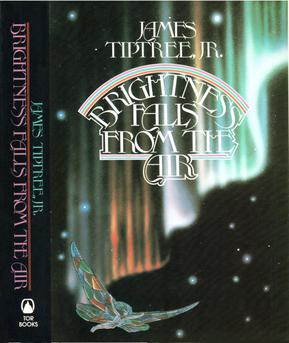Related Research Articles
The New Wave was a science fiction (SF) style of the 1960s and 1970s, characterized by a great degree of experimentation with the form and content of stories, greater imitation of the styles of non-science fiction literature, and an emphasis on the psychological and social sciences as opposed to the physical sciences. New Wave authors often considered themselves as part of the modernist tradition of fiction, and the New Wave was conceived as a deliberate change from the traditions of the science fiction characteristic of pulp magazines, which many of the writers involved considered irrelevant or unambitious.

Dangerous Visions is an anthology of science fiction short stories edited by American writer Harlan Ellison and illustrated by Leo and Diane Dillon. It was published in 1967 and contained 33 stories, none of which had been previously published.

Algirdas Jonas "Algis" Budrys was a Lithuanian-American science fiction author, editor, and critic. He was also known under the pen names Frank Mason, Alger Rome, John A. Sentry, William Scarff, and Paul Janvier. He is known for the influential 1960 novel Rogue Moon.
"'Repent, Harlequin!' Said the Ticktockman" is a dystopian science fiction short story by American writer Harlan Ellison that was published in 1965. It is nonlinear in that the narrative begins in the middle, then moves to the beginning, then the end, without the use of flashbacks. Stylistically, the story deliberately ignores many of the conventional "rules of good writing", including a paragraph about jelly beans which is almost entirely one run-on sentence. First appearing in the science fiction magazine Galaxy in December 1965, it won the 1966 Hugo Award, the 1965 Nebula Award and the 2015 Prometheus Hall of Fame Award.

Time and Stars is a collection of science fiction short stories by American writer Poul Anderson, published in 1964.

Pavane is an alternative history science fiction fix-up novel by British writer Keith Roberts, first published by Rupert Hart-Davis Ltd in 1968. Most of the original stories were published in Impulse. An additional story, "The White Boat", was added in later editions.
The Golden Age of Science Fiction, often identified in the United States as the years 1938–1946, was a period in which a number of foundational works of science fiction literature appeared. In the history of science fiction, the Golden Age follows the "pulp era" of the 1920s and 1930s, and precedes New Wave science fiction of the 1960s and 1970s. The 1950s are, in this scheme, a transitional period. Robert Silverberg, who came of age in the 1950s, saw that decade as the true Golden Age. According to historian Adam Roberts, "the phrase Golden Age valorises a particular sort of writing: 'Hard SF', linear narratives, heroes solving problems or countering threats in a space-opera or technological-adventure idiom."
Thomas L. Sherred was an American science fiction writer.
"The Jigsaw Man" is a science fiction short story by American writer Larry Niven, set in the Known Space universe. The story was first published in Harlan Ellison's anthology Dangerous Visions, and is included in Niven's collections All the Myriad Ways and Tales of Known Space.
"Gonna Roll the Bones" is a fantasy novelette by American writer Fritz Leiber, in which a character plays craps with Death. First published in Harlan Ellison's Dangerous Visions, it won both the Hugo Award and Nebula Award for Best Novelette.
"Judas" is a short story by John Brunner from Harlan Ellison's anthology Dangerous Visions. The story examines a modern allegory of the Biblical figure of Judas.
"The Doll-House" is a short story by Hugh Jones Parry, under the name "James Cross". It was first published in Harlan Ellison's 1967 science fiction anthology Dangerous Visions.
"If All Men Were Brothers, Would You Let One Marry Your Sister?" is a science fiction short story by American writer Theodore Sturgeon. It first appeared in Harlan Ellison's anthology Dangerous Visions in 1967.

Infinity Science Fiction was an American science fiction magazine, edited by Larry T. Shaw, and published by Royal Publications. The first issue, which appeared in November 1955, included Arthur C. Clarke's "The Star", a story about a planet destroyed by a nova that turns out to have been the Star of Bethlehem; it won the Hugo Award for that year. Shaw obtained stories from some of the leading writers of the day, including Brian Aldiss, Isaac Asimov, and Robert Sheckley, but the material was of variable quality. In 1958 Irwin Stein, the owner of Royal Publications, decided to shut down Infinity; the last issue was dated November 1958.

The Einstein Intersection is a 1967 science fiction novel by Samuel R. Delany. The title is a reference to Einstein's Theory of Relativity connecting to Kurt Gödel's Constructible universe, which is an analogy to science meeting philosophy. Delany's intended title for the book was A Fabulous, Formless Darkness.

The Last Hurrah of the Golden Horde is the first collection of science fiction stories by author Norman Spinrad. It was originally published by Nelson Doubleday in August 1970 with a Science Fiction Book Club edition and by Avon Books the following month. The collection placed eighth in the Locus Poll for best sf anthology or collection of the year.

Alpha 2 is a science fiction anthology edited by Robert Silverberg, first published as a paperback original by Ballantine Books in November 1977. No further editions have been issued. .

Brightness Falls from the Air is a 1985 science fiction novel by American writer James Tiptree Jr., set in the same fictional universe as the stories in her 1986 collection The Starry Rift.

Nebula Award Stories 3 is an anthology of award-winning science fiction short works edited by Roger Zelazny. It was first published in the United Kingdom in hardcover by Gollancz in November 1968. The first American edition was published by Doubleday in December of the same year. Paperback editions followed from Pocket Books in the U.S. in February 1970, and Panther in the U.K. in November 1970. The American editions bore the variant title Nebula Award Stories Three. The book was more recently reissued by Stealth Press in hardcover in June 2001. It has also been published in German.
Green Eyes is a novel by Lucius Shepard published in 1984.
References
- ↑ Maps: The Uncollected John Sladek, reviewed by Graham Sleight at Infinity Plus; published March 15, 2003; retrieved August 15, 2017
- ↑ The Steam-Driven Boy, by John Sladek, reviewed by Keith Brooke, at Infinity Plus; published April 29, 2006; retrieved August 15, 2017
- ↑ Budrys, Algis (April 1968). "Galaxy Bookshelf". Galaxy Science Fiction. pp. 155–163.